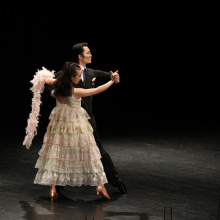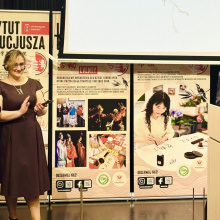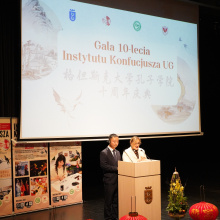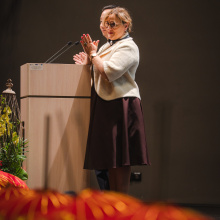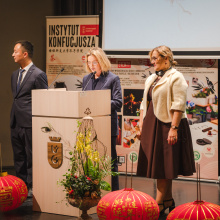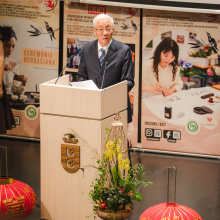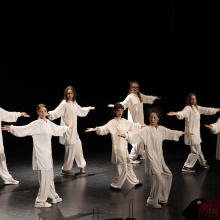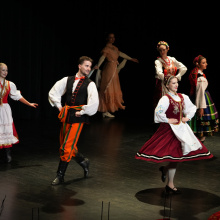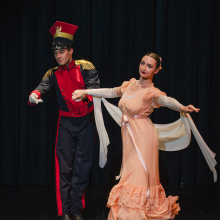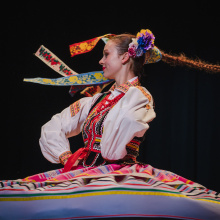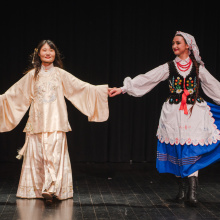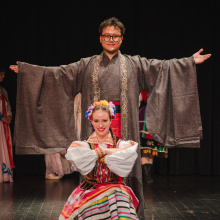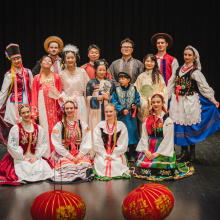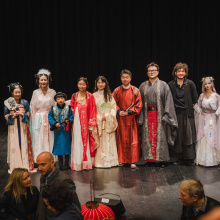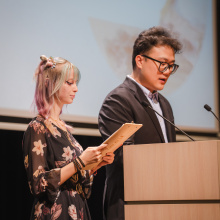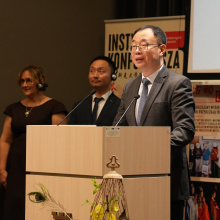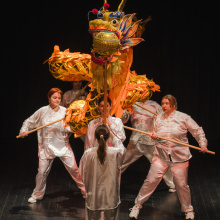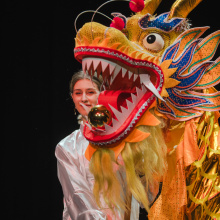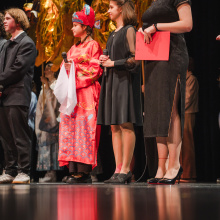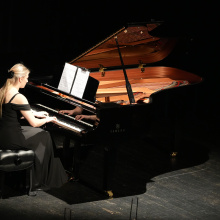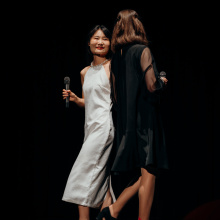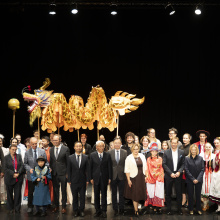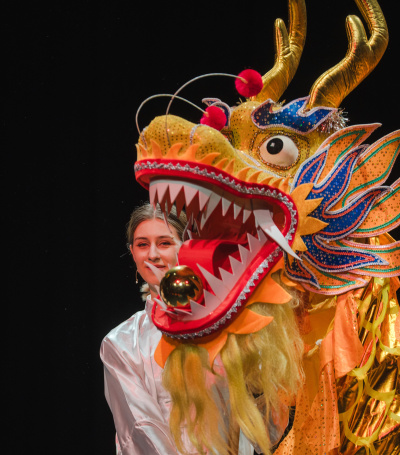
Lion and dragon dances, ocarina playing and a Polish-Chinese fashion show - on 26 October, the 10th anniversary of the Confucius Institute at the University of Gdańsk was celebrated in the Prof. Jerzy Limon Theatre Hall in the Modern Languages building. ‘For ten years, we have been breaking down cultural barriers and building bridges to the Chinese language,’ said Julia Tusk and Wang Liuyang, hosts of the artistic part of the gala.
The ceremony was attended by, among others, the Ambassador of the People's Republic of China to Poland, Lu Shan, the Rector of the University of Chinese Academy of Social Sciences (UCASS), prof. Zhang Zhengwen, the Senior Rector of the University of Gdańsk, prof. Bernard Lammek, and the former Vice-Rector of the University of Gdańsk, dr Józef Arno Włodarski.
On behalf of His Magnificence, the Rector of the University of Gdańsk, the guests were welcomed by the Vice-Rector for Cooperation and International Relations of the University of Gdańsk, dr hab. Anna Jurkowska-Zeidler, prof. UG, who thanked those who had built the Confucius Institute in Gdańsk from the very beginning of its existence. She also pointed out that the patron of the institute, the Chinese thinker and philosopher, was the first teacher in history to receive a salary from public funds: ‘Confucius repeatedly emphasised the joy that comes from working on oneself, from self-improvement, and from learning. This joy of learning and working together for the common good is the foundation of our partnership and a guarantee that the next 10 years will be even richer in experience and mutual inspiration,‘ she said, recalling that the philosopher ’spoke of full respect for cultural dialogue, which is celebrated every day here in Gdańsk, at the Confucius Institute.’
The ceremony was also honoured by the presence of Lu Shan, who, emphasising the contribution of the Confucius Institute at the University of Gdańsk to the popularisation of Chinese culture and the deepening of Sino-Polish friendship, added: ‘A Chinese proverb says: ‘It takes ten years for a tree to grow.’ After ten years of operation, the Confucius Institute at the University of Gdańsk has grown into a tree bearing abundant fruit and is now at an important moment, combining the achievements of the past with the prospects of the future.’
The Rector of the Chinese Academy of Social Sciences, prof. Zhang Zhengwen, emphasised that Chinese-Polish friendship has deep roots, referred to the strategic partnership between Poland and China, and pointed out that the Confucius Institute at the University of Gdańsk is a living example of the implementation of this strategic vision in practice - ‘treating language as a bridge and culture as a boat, it solidly builds a path to connect the hearts and minds of both nations.’
Prof. Zhang Zhengwen talked about the development of the Confucius Institute at the University of Gdańsk, from classroom activities to cultural events, from the Chinese Bridge competition to scholarship programmes, from academic classes to local initiatives. He also presented the Institute's successes from the past year: 50 students from various educational levels took part in the Polish stage of the Chinese Bridge competition, 205 people took the HSK exam, and 400 spectators attended the New Year's Eve celebration marking the beginning of the Year of the Snake. In addition, 20 students from Poland took part in the scholarship programme. The Rector assured that the University of the Chinese Academy of Social Sciences would remain the most loyal ally of the Confucius Institute at the University of Gdańsk.
The gala was divided into four chapters, each of which began with a video report presenting the history of the institution and the people who make it up. The following people were responsible for this project: Alicja Kisiel, Maksym Bobrowski and Julia Tusk - employees of the Confucius Institute and graduates of Sinology at the University of Gdańsk.
Difficult beginnings
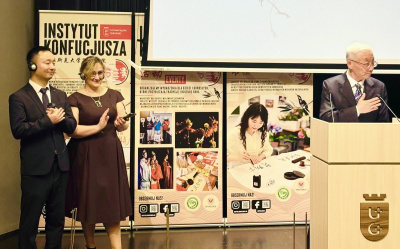
The Confucius Institute at the University of Gdańsk was opened on the initiative of the then rector's office in 2015.
Senior Rector prof. Bernard Lammek recalled in a report presented during the gala that efforts to establish the Confucius Institute began during the term of Rector Andrzej Ceynowa: ‘The consulate and Beijing promised us the moon, but years passed and the institute was still nowhere to be seen. We thought long and hard about what to do to finally get things moving, and we came to the conclusion that we would ask Prime Minister Donald Tusk for help. The Prime Minister agreed and wrote a short letter stating that he supported the efforts of the University of Gdańsk to establish a Confucius Institute at the University, and a miracle happened. As if by magic, everything suddenly gained momentum.’
‘Finally, after more than three years, in 2015, the fifth Confucius Institute in the country was established at the University of Gdańsk,’ added the then Vice-Rector for Student Affairs at the University of Gdańsk, dr Józef Arno Włodarski.
One of the previous directors of the UG Confucius Institute, prof. dr hab. Wojciech Bizon, also spoke about the beginnings of the institute. The current Director of the Institute, prof. dr hab. Aneta Lewińska, who, before taking up this position, taught Polish as a foreign language to students at a Chinese university in Harbin for many years, also shared her perspective: ‘Since last year, I have been among Chinese employees and teachers of Chinese as a foreign language. This extraordinary exchange of experiences, this extraordinary meeting, proved to be a very developmental, inspiring and interesting start to a new stage for me. I accepted the position of director of the Confucius Institute as a challenge in my development so far.’
They teach Chinese and learn about Polish culture
Who teaches Chinese? And how do they perceive their Polish students? Viewers could find out in the second part of the video report. Among the Chinese teachers are Liu Zixuan and Chen Kai, who decided to revolutionise their lives about 10 years ago and moved to Gdańsk to teach Chinese. How do they like living here? ‘I have met many Poles - they have all been extremely nice, warm and friendly to me,’ said Liu Zixuan. The Chinese teacher admitted that during classes with children, she tries to explain issues from her native language in Polish: ‘It's a lot of fun because they correct my Polish. Thanks to the fact that the boundaries are blurred and they can become teachers, not just students, they become more active.’
And what kind of students are we? ‘Poles are conscientious, hard-working and respect their teachers,’ added the Director of the Confucius Institute, dr Guan Yu, Associate Professor.
The audience then enjoyed tai chi demonstrations by teachers and students of the Confucius Institute at the University of Gdańsk. Maksym Bobrowski performed a rock version of the song ‘You were once young’, accompanied by a photo report from the Middle Kingdom.
‘The meeting of different cultures is a real gift. A gift that we want to reciprocate. At the Confucius Institute in Gdańsk, there are people who do this from the heart, with passion, with love for what unites us. Chinese characters carry sincere intentions and the joy of meeting friends from afar. The sound of the ocarina reminds us that music truly knows no boundaries, and the dumplings conceal wishes for closeness and community. It is this passion and cordiality that make language and culture the most beautiful gift of friendship between Poland and China,’ commented Julia Tusk, who co-hosted the artistic part of the event with Wang Liuyang.
China at your fingertips
The Confucius Institute also offers study trips to China. In the next part of the report, students of Chinese studies, who were able to deepen their knowledge of Mandarin and learn about the local culture at Chinese universities, shared their impressions of their stay.
Julia Tusk spent six months at Nanjing University: ‘It was an unforgettable experience. To be honest, it changes you as a person.
Alicja Kisiel chose Hainan University: ’I went to one of the more tropical provinces of China. I chose this place for a reason, because I wanted to experience something different from what we have in Poland.’
‘Not only did I study and learn, but I also had many opportunities to travel,’ admitted Maksym Bobrowski, who studied at Nanjing University for six months.
Without exception, all the scholarship holders repeated that their stay had awakened their curiosity and imagination, and they assured us that they would definitely return to this country.
After the presentation of the report, Agata Knabe played Waltz in A minor, B 150, Op. posth. by Fryderyk Chopin, and then, thanks to Hu Wenjun and Ming Yang, the audience was transported to the other side of the world, admiring their expressive Latin American dance. The culmination of this part of the gala was a performance by Natalia Richert, who performed the song ‘Just met you’. ‘Sometimes we just meet. Just as we encountered the Confucius Institute on our path and fell in love with the Chinese language. Thank you to all those who are learning Chinese. It is thanks to you that we can see the beauty of these unique encounters,’ commented the hosts of the event, Julia Tusk and Wang Liuyang.
Towards the future
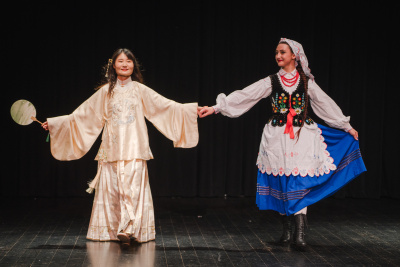
Celebrating the Institute's decade of existence, the past years were recalled, but the future was also looked to, which is represented by successive generations of Mandarin enthusiasts who are involved in learning Chinese professionally or as a hobby. Volunteers, interns and students working with the Confucius Institute talked about their experiences in the fourth part of the report. In the artistic part, Maria Lejczak, two-time Polish champion of the Chinese Bridge World Competition in the student category, presented an excerpt from the Chinese opera ‘Huang May’ (‘The Lady of the Imperial Palace’). The Polish-Chinese fashion show ‘Silk Road’, a joint performance by the Jantar ensemble, Chinese teachers from the IK and students of Sinology, choreographed by Marta Zacharska-Gazda, aroused the enthusiasm and delight of the audience. The young artists presented Polish and Chinese costumes as well as regional dances. The audience could admire, among others, costumes from Łowicz, Lublin and the highlands. The culmination of this part was the performance of the song ‘Lepsze jutro’ (‘A Better Tomorrow’) by Kinga Kizner, Artur Simkin, Maria Lejczak, Maksym Bobrowski and Natalia Richert.
‘For 10 years, we have been breaking down cultural barriers, building a bridge to the Chinese language. For 10 years, we have gained friends, teachers and students, and our shared passion has kept us warm all this time. For 10 years, we have witnessed development and together we have created small and great miracles. 10 years is not the end, but the beginning of a new chapter,’ said the hosts of the artistic part.
At the end of the ceremony, the Director of the Institute, prof. Aneta Lewińska, took the floor and thanked those who contributed to the development of the unit and invited the guests to the stage for a group photo. ‘Ten years of our activity is the result of the efforts of many Polish and Chinese directors. It is the effort of students and all those who are fascinated by the culture of China.’

